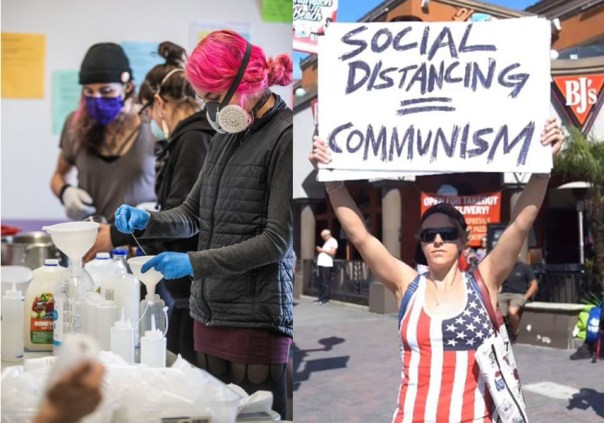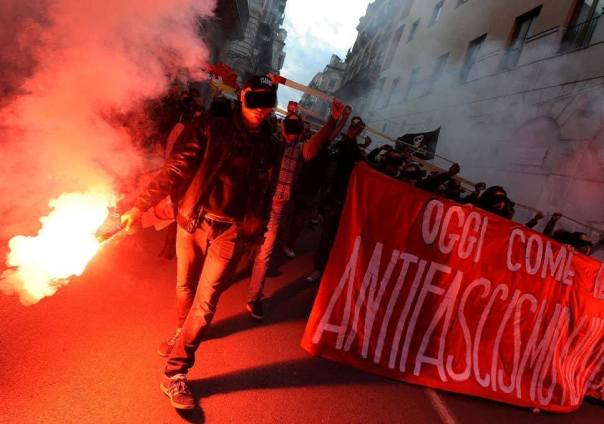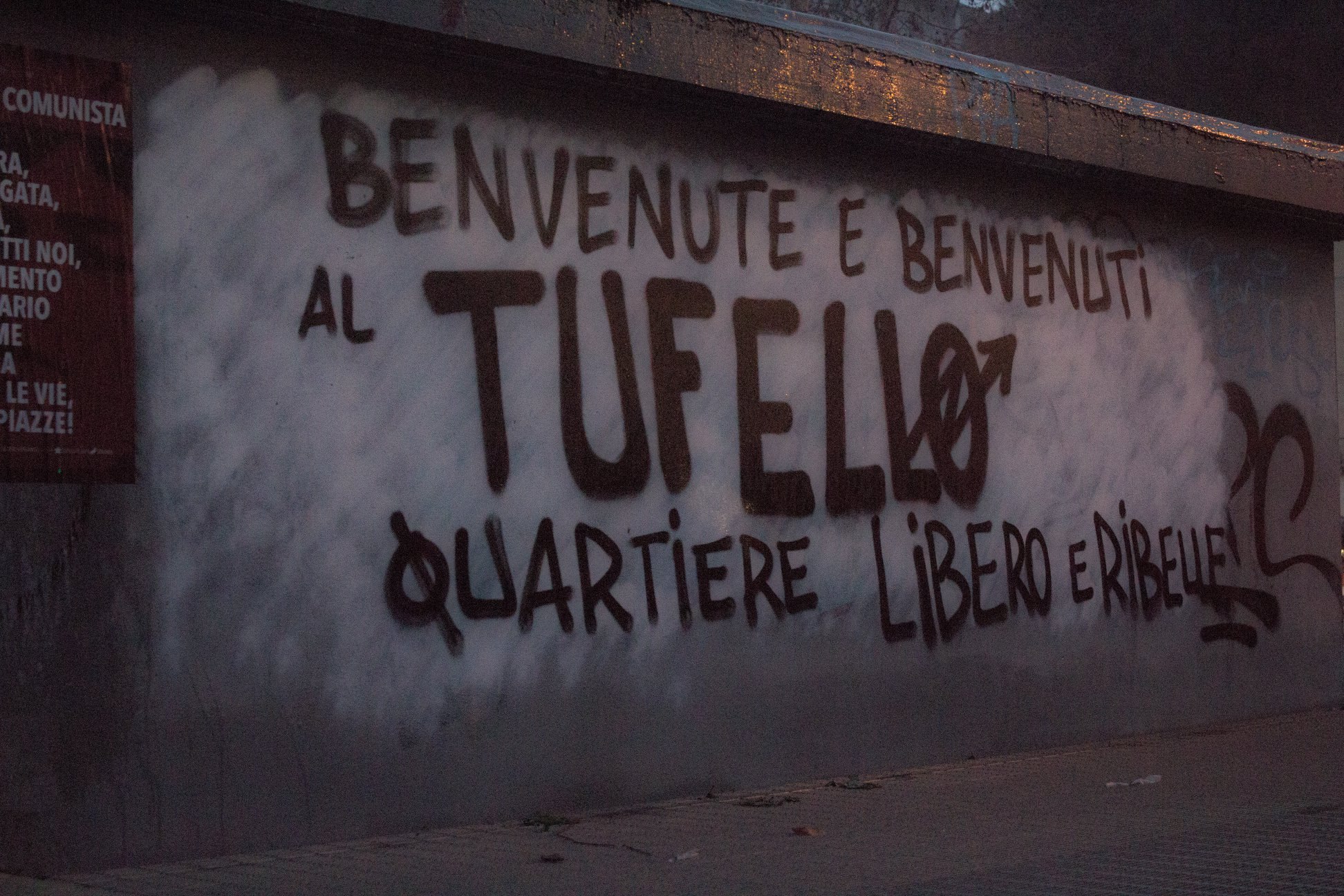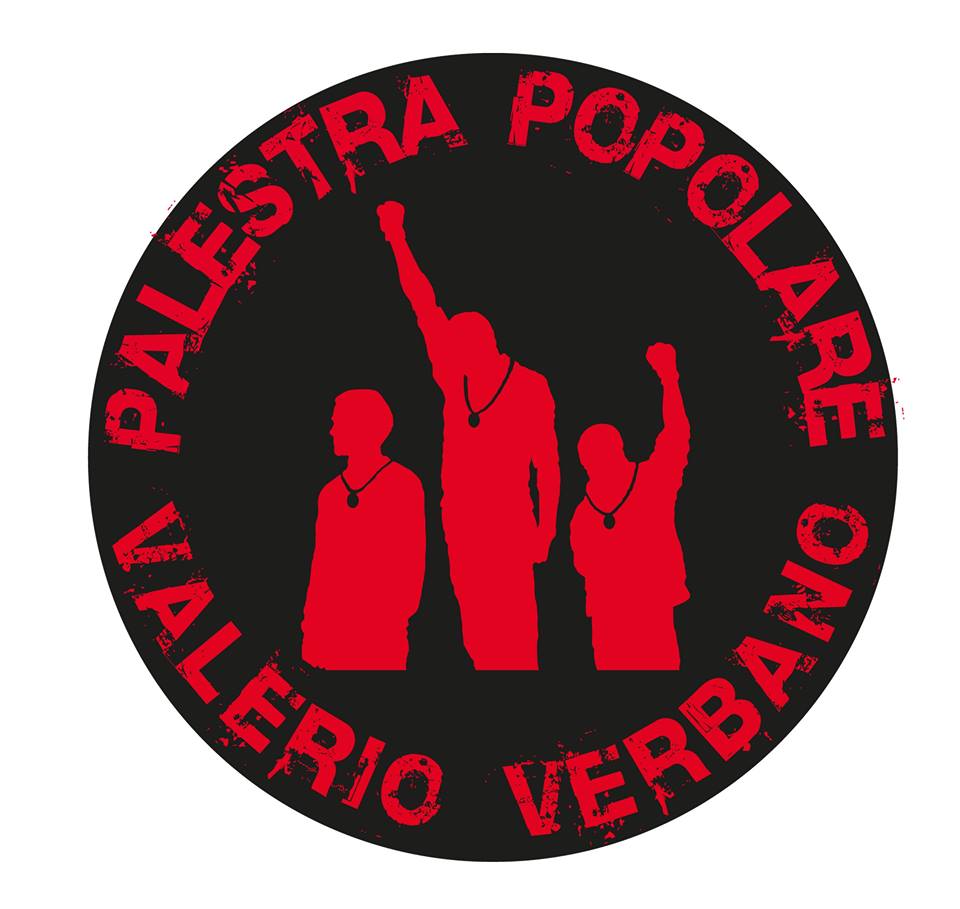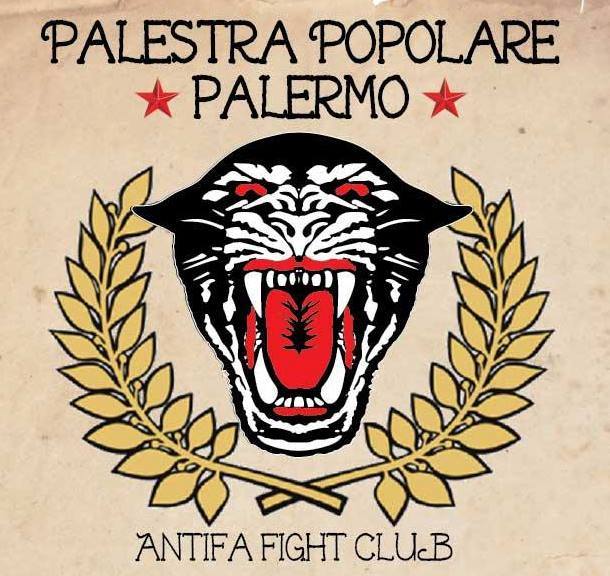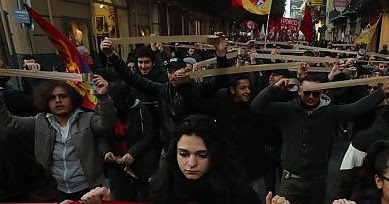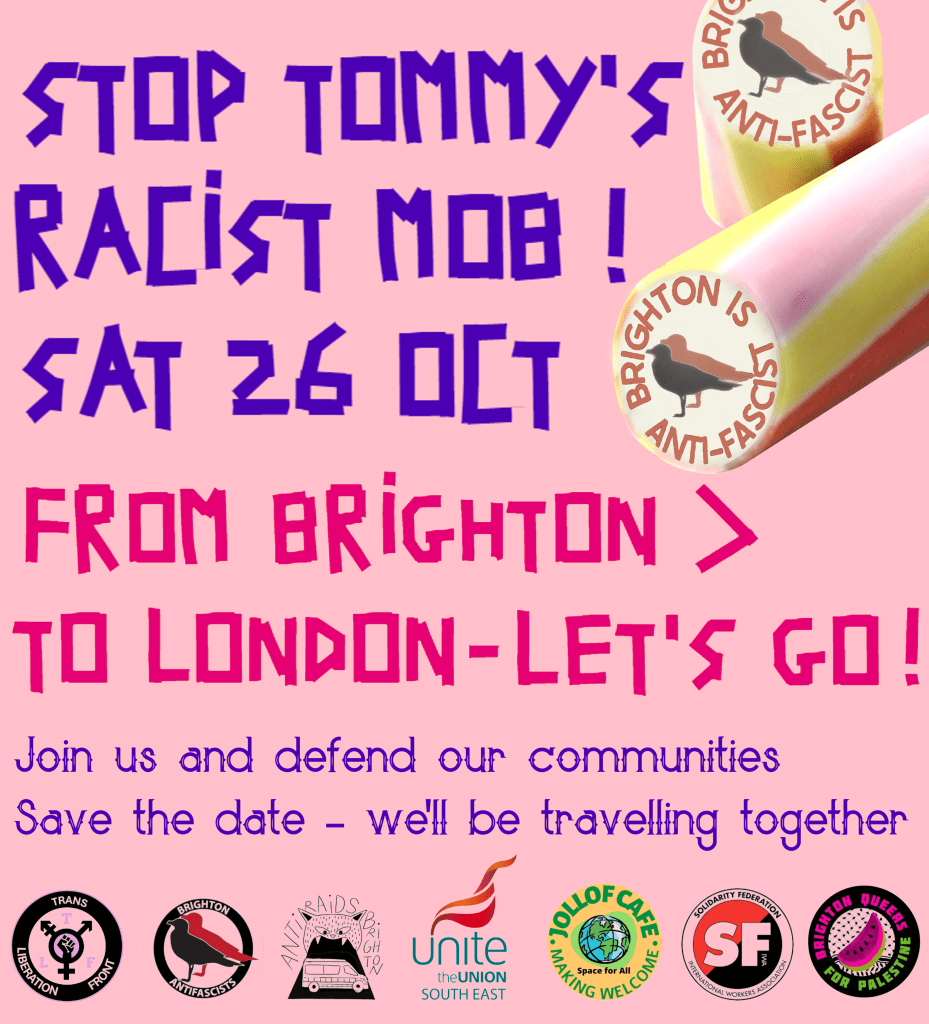
August saw our amazing community response to the threat of racists on the streets of Brighton. Thousands of us showed up in defence of our neighbours and in solidarity with migrant and muslim communities. Now we have another call to action.
The worst racist riots in a century directly followed hate preacher Tommy Robinson’s march through London days before. His followers chanted his name as they attacked people of colour in the street and terrorised migrants. Now he has the shamelessness to call out his racist mob again and we’re not letting them have the streets this time.
These far right rallies in the capital pose a direct threat to us and our communities back home. Just as community defence networks formed across the country to mobilise against the racist riots, an autonomous antifascist mobilisation on October 26th will ensure Tommy’s next far right day out will not go unopposed.
From across the country, communities will be converging on London, showing up for each other and making sure there is no repeat of the hateful racist violence in our towns and cities.
We will be travelling together from Brighton in the morning. Commit to come and tell your friends.
This is how we defeat the far right. Make every neighbourhood antifascist.
f
g
Brighton Antifascists
 Welcome to Brighton Antifascists. We are an independent group, based in Brighton, that formed as a response to an increase in nationalist and fascist activity in our community. We are willing to confront any fascist/racist activities in our area, by encouraging mass direct action amongst other methods. We are not aligned with any political party, nor do we co-operate with any, we also don’t work with the police. The state cannot be relied upon to oppose fascism, and will tolerate or encourage fascist groups when it suits its
Welcome to Brighton Antifascists. We are an independent group, based in Brighton, that formed as a response to an increase in nationalist and fascist activity in our community. We are willing to confront any fascist/racist activities in our area, by encouraging mass direct action amongst other methods. We are not aligned with any political party, nor do we co-operate with any, we also don’t work with the police. The state cannot be relied upon to oppose fascism, and will tolerate or encourage fascist groups when it suits its purposes. We try to organise as a non-hierarchical group. We are part of the nationwide Antifascist Network, which works to encourage militant resistance to fascists and racists where ever they rear their unwelcome heads. If you have any information on fascist activity please email us at brightonantifascists@riseup.net
purposes. We try to organise as a non-hierarchical group. We are part of the nationwide Antifascist Network, which works to encourage militant resistance to fascists and racists where ever they rear their unwelcome heads. If you have any information on fascist activity please email us at brightonantifascists@riseup.net
POSIE PARKER, YOU CAN’T HIDE – YOU’VE GOT NAZIS ON YOUR SIDE!
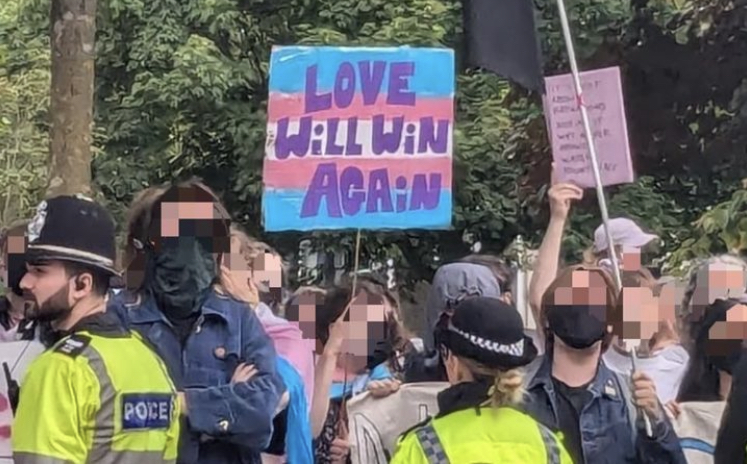
On Sunday, Brighton definitively showed Kellie Jay Keen (AKA Posie Parker) she’s still not welcome here!
In a glorious colourful display of solidarity, a community mobilisation of 150-200 trans people, trans allies and people who just don’t like far-right grifters speaking in their town centre completely surrounded the meagre crowd of 50 who had assembled to listen to her bigotry. Brighton Antifascists and Trans Liberation Front Brighton collaborated together at very short notice to pull off an example of mass community mobilisation at its best, seeing an active and empowered crowd spontaneously working together to a run the haters out of town.
Kellie Jay Keen is Britain’s most extreme and notorious transphobe. In classic right-wing grifter mode, she’s tried to build an online career on shock tactics and outrage. But she is more than just an anti-trans bigot. She represents the cross over from the ‘Gender Critical’ movement, which theoretically thinks of itself as feminist, into the proper far-right. She has declared herself “not a feminist” and put huge time and effort into building links with the American Christian Nationalist right and dipping her hand into its deep pockets. She has been funded by the CPAC conference which has openly called for the “elimination” of trans people. The American ‘conservatives’ of the Heritage Foundation and the Alliance for Defending Freedom (classified as a ‘hate group’ by the Southern Poverty Law Centre) love her transphobia and want to use it as the wedge to further their wider agenda of rolling back abortion access, ending gay marriage and even restricting access to contraception, all of which Keen has happily nodded along with. So we have the bizarre spectacle of her followers, who presumably still think of themselves as feminists, happily helping make the Handmaids Tale a real thing because hating trans people has become so important for them it outweighs all else. Keen has become so extreme that she has even been denounced by other TERF groups such as Women’s Place UK.
Keen has long attracted support from the far-right, and has herself praised Tommy Robinson. In her ongoing efforts to ingratiate herself with racists she has expressed support for Zionism, denigrated Palestinians and posted anti-Muslim hate. Supporting Zionism hasn’t stopped her also managing to get pally with anti-semites and neo-Nazis however. She has been hosted by white nationalist livestreamers, a speaker at one of her rallies quoted Mein Kampf favourably and in Australia she even attracted an ‘honour guard’ of sieg-heiling neo-Nazis with a banner saying “Destroy Paedo Freaks”. Nice people.
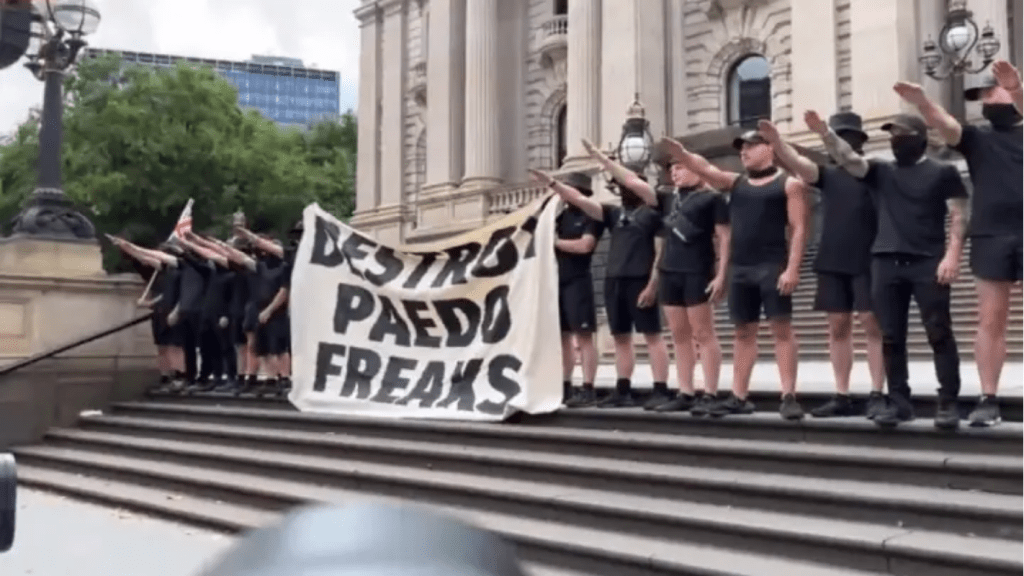
Her rallies in Britain have also sometimes attracted attendance from some proper far-right nasties. However, this time out her shrunken crowd seemed to consist almost entirely of older women and some men, more of the “had my brain melted on Facebook and now I’m Graham Linehan” variety rather than violent goons. However standing up to hatemongers is vital whether they are waving a Stella and an England flag or doddering around holding a “TERF island” (yes really!) banner. The insane explosion of anti-trans hate we have seen in the last few years in this country, quite apart from the huge damage it does on its own, has become simultaneously one of the major gateway drugs and recruiting tools of the contemporary far-right and also an increasingly mainstream political position. From Putin in Russia to Trump in America and on to our own lovable and late lamented Tory Party, dunking on trans people has become flavour du jour as part of any aspiring nationalist’s platform.
Keen last came to Brighton in 2022, when roughly equal numbers confronted each other in a messy demo and counter demo which saw some of her supporters arrested for violent assault. Nevertheless, she was able to try and paint this as a success. This time round it’s going to be a lot harder for her to represent this as a victory. By using the cunning ruse of walking around the edges of the police line we completely surrounded her crowd. She was totally drowned out by our chants, sirens and pots and pans, so that you couldn’t hear anything on her livestream of the demo. Very notably our crowd contained people of all ages and had all the energy and humour. Her crowd were tired, old and quiet – straining to listen to the inaudible speeches. Passersby were leafletted and informed of what was going on and what the real politics of ‘Let Women Speak’ are all about to almost universally supportive reactions. After a mere hour of trying to lipread bigotry, they called it a day and packed up an hour earlier than planned. Kellie Jay showed the extent of her loyalty to her fans as she abandoned them, piled into a Range Rover with her private security goons and zoomed off at high speed.

As ‘Nazi Barbie’ vanished into the sunset, her beleaguered supporters had to trudge on foot through Brighton’s busy streets pursued by an impromptu Pride parade chanting “train station’s that way!” This march of shame through the town centre resulted in a surreal coda to the days’ events, as a group of Posie supporters being escorted out of town by the heckling crowd chose to duck into the North Laine Bazaar on Upper Gardener St, which they then refused to leave. A stalemate ensued as the crowd sat down in the road outside chanting “Fuck off – Go home”. The owner of the flea market came out to tell us she was on our side and had asked the police to remove them but they were refusing to leave the shop. Someone in our crowd presented the shop owner with a bunch of flowers and she came and joined our demo to a huge round of applause! In the end three vanloads of cops had to arrive in order to load 5 or 6 Posie fans into the back and drive them off.
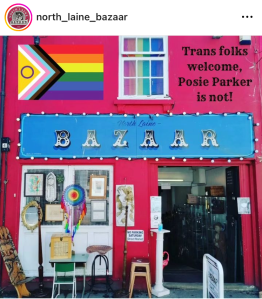
Meanwhile in a parallel street, another small group of Posie fans ended up in the middle of a street party. One of them bizarrely decided this was the perfect moment to whip out his Israel flag, which he promptly had confiscated. In the ensuing confusion he also managed to lose his flip-flops and thus presumably had to go home barefoot. The gentleman’s flip-flops are now in the possession of demonstrators and will be donated to an appropriate museum as a valued artefact.
After all this will Kellie and her merry band of bigots be rushing to come back to Brighton? Let’s hope not. But if they do we’ll be ready.
A big thank you to everyone who helped organise the day and to everyone who turned out and helped make it what it was! ❤️ 🖤
For more in depth unpleasant background information see: posieisafascist.com , Hope not Hate Kellie Jay Keen Case File , Pink News profile and The National profile
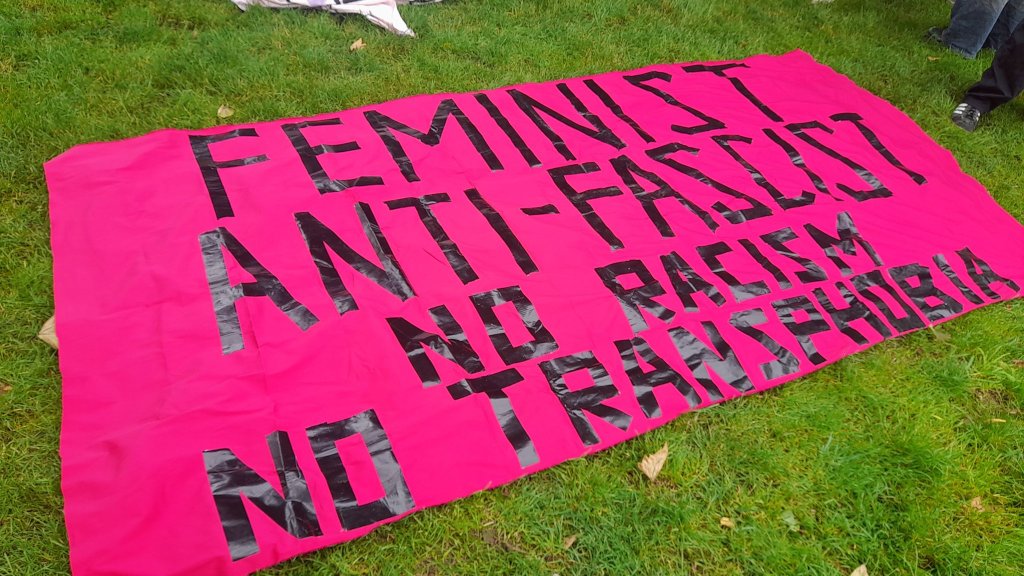
Solidarity against barbarism: The fight against coronavirus and the far-right in the USA
Like everyone else we’ve been in lockdown, spending a lot of time at home with our stockpile of beans in our Antifa™ bunker. But we’ve also stayed active playing our part in local organising initiatives in Brighton and further afield – food banks, food deliveries, mutual aid groups, projects manufacturing PPE etc. And we’ve also made time to chat to some comrades from Oregon about what’s going down in the USA, where they have also had to contend with a social situation that is in some ways more extreme and also with right-wing street movements protesting the lockdown. The following is an interview with Alexander and Thomas, two anarchists who are active in anti-fascist and left organizing in Portland, Oregon.
Brighton Non Si Lega
This Saturday evening, several hundred Brightonians once again stood against racism and fascism, not allowing it to fester in our streets. Once again we showed Brighton as a city of sanctuary, diversity and always anti-fascist.
We began in good spirits with local anti-fascist history in the very streets where we stood. Our Italian friends then explained how dangerous La Lega, Salvini and them making links with British fascists really are. A chorus of Bella Ciao then broke, echoing through North Laine as we began to march. La Lega were due to meet in a pub by the train station, however we arrived to find that they had in fact cancelled their event due to our mobilisation and the realisation that hundreds of us would not allow this to take place in our city. Instead, all 6-7 of them hid in a local fascists’ house and named that as their meeting, too afraid, too scared to show their faces on the streets of Brighton. Upon this news we proceeded to have a victory march, occupying our streets with chants of Siamo Tutti Anti-Fascisti! And From the Downs to the Sea, Brighton will be Fascist Free! So it remains since 2014.
Thank you to everyone that came out. As a community we continue to fight politics of hate and division.
Vaffanculo Salvini e La Lega
Brighton Antifascists to oppose Italian far-right meeting this Saturday
The Italian far-right party La Lega, led by extreme-right nationalist Matteo Salvini, have scheduled a dinner for supporters in the Gloucester Street area of Brighton at 6pm on Saturday evening. We will be opposing this. Check our Facebook and Twitter for updates and details as the day gets closer.
Here is our full press release:
Anti-fascists to oppose Italian far-right meeting in Brighton Saturday
Anti-fascist and anti-racist activists are set to oppose a meeting of Italy’s far-right La Lega party scheduled due to be held in Brighton on Saturday.
La Lega, led by extreme-right nationalist Matteo Salvini, have scheduled a dinner for supporters in the Gloucester Street area at 6pm on Saturday evening.
Exclusive interview with the amazing Rose City Antifa
We here present an interview with the (in)famous Rose City Antifa from Portland, Oregon – one of the oldest and most renowned North American antifascist groups. They have been going 13 years now and have attracted a lot of attention for some highly publicised confrontations with the far-right in their home city. Of course, as we all know, ‘everyday antifascism’ involves a lot more than show-piece confrontations, so here we also delve into the background of their work, what keeps them going and how they deal with the many problems antifascist organising throws up.
A NEW MEANING TO THE WORD ‘FEMINAZI’
Ok so first of all let us welcome our friends over there from 120dB! Congratulations on successfully crossing the border… I can proudly say that I am standing here alongside the true daughters of Europa.
 But jokes aside we are here because we want to provide another narrative from that of 120dB. To say that to criminalize migrants, distort rape statistics and create a moral panic is not going help women! It is not going to help white women, women of colour, disabled women, nor the queer community and it is definitely not going to help migrant women. But it will help fascists!
But jokes aside we are here because we want to provide another narrative from that of 120dB. To say that to criminalize migrants, distort rape statistics and create a moral panic is not going help women! It is not going to help white women, women of colour, disabled women, nor the queer community and it is definitely not going to help migrant women. But it will help fascists!
Let’s remember that being a woman is not a disqualifying factor for being a Nazi! 120dB try to neutralize their words. They claim to be speaking on behalf of all women, on behalf of all victims of sexual assault. But they are not. Skewing statistics on a propaganda push, demanding deportations, the integrity of the ethno-state and the criminalization of refuges and migrants are political positions. Utilising the violence that is committed against women for the purpose of perpetuating bigotry, racism and fear is a political choice. One that Annika, and the other women of 120dB have taken. So on a day of feminist resistance lets not take Annika and her fellow activists as the stereotype of the passive woman that we all know to be untrue. Let’s take them as what they are, which is far right militant activists. They use the violence which is carried out against women’s bodies and which women are brought up to fear from birth for the purpose of a far-right political project.
Anti-Fascism, Jihadism and The FLA
The Football Lads Alliance (FLA) march in London last Saturday, saw large crowds (estimated between 5,000 to 20,000) gathered to protest Islamic extremism. The stated aim, at least from the organisers, was to demand the arrest, internment and or deportation of 23,000 ‘extremists’ without trial.

The FLA preparing to march.
